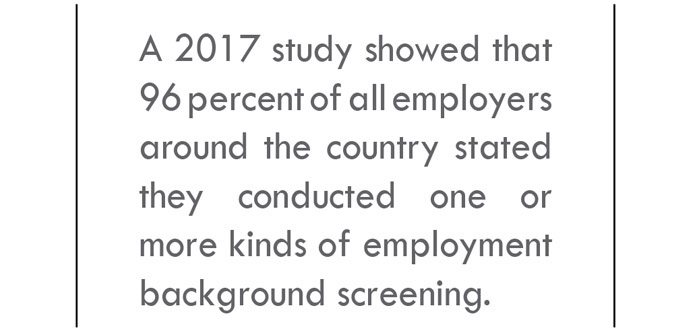Generally, employers want to know as much about job applicants as reasonably possible before deciding whether to employ them. Having more information helps the employer make a more informed decision; it improves the quality of its hires, protects the company reputation and ensures that employees are safe in the workplace. While an employer will seek to draw out this information in an interview (although this should be done carefully — see below), more and more employers are turning to some form of background screening to gather information on prospective employees; a 2017 study showed that 96 percent of all employers around the country stated they conducted one or more kinds of employment background screening. Some employers may be equipped to check on applicants using their own internal resources, but many will need to seek the assistance of a third-party to gather relevant information.
Although background checks can be a valuable source of information, employers should be careful — the practice of background checking applicants is subject to multiple layers of shifting regulatory regimes which, if an employer is not careful, are easily run afoul of. Many employers and background check companies have been following the same procedure for years which has since become outdated.
Federal, state, and even local laws are often implicated, and different kinds of information commonly sought (and different methods of seeking it) trigger different protections. Recent case law has further complicated the matter, and different levels of regulation can control what information may be considered, when it may be considered, and the ways in which it can be obtained.
At a federal level, the Fair Credit Reporting Act (FCRA) regulates the performance of background checks by third parties. The Act only allows for soliciting a background check for a “permissible purpose,” laying out the permissible reasons for seeking such information, including “employment purposes.” The FCRA requires that before an employer may have a background check run on an employee or prospective employee by a third party (a “consumer reporting agency”), the employer must make a “clear and conspicuous” written disclosure to the employee or prospective employee that a report will be obtained, and the disclosure must be in a document that consists “solely” of the disclosure. The prospective employee must then authorize in writing the procurement of that report.
These requirements are deceptively simple, and two recent Ninth Circuit decisions have highlighted that they are not as easily complied with as many thought. In 2017, the Ninth Circuit decided in Syed v. M-I, LLC that an employer willfully violated the FCRA when any additional terms were included in the disclosure and authorization (in that case, a broad liability release was included in addition to all the necessary terms). Then, in 2019, the Ninth Circuit decided another “clear and conspicuous” case that was less obvious to the observer. In Gilberg v. Cal. Check Cashing Stores, LLC, the Court held that an employer included the necessary disclosure, but that the disclosure disclosed too much; the employer had included the necessary federal disclosures, but had also included disclosures required by state credit reporting laws. The takeaway? Employers must give multiple, carefully crafted disclosures to an individual on which they will procure a background check, and the federal disclosure must be entirely on its own.
But the state laws aren’t necessarily simple to comply with either. While a state may not have any additional requirements, many have passed their own laws to add requirements or restrictions they feel are important or necessary. For example, in Oregon, an employer may only obtain or use information that “bear’s on a consumer’s creditworthiness, credit standing, or credit capacity” if that information is “sufficiently job-related,” and the employer provides the reasons for using the information in writing to the employee. The information is sufficiently job-related if “an essential function of the position at issue requires access to financial information not customarily provided in a retail transaction that is not a loan or extension of credit… or the position at issue is one for which an employer is required to obtain credit history as a condition of obtaining insurance or a surety or fidelity bond.”
Furthermore, Oregon has a “Ban-the-Box” statute, which makes it an unlawful practice for an employer to exclude an applicant from an initial interview solely because of a past criminal conviction. In practice, this means an employer may not require an applicant to disclose a criminal conviction prior to an initial interview. But if you are in Portland, you may be subject to a stricter requirement under city ordinance; an employer subject to that ordinance may consider an applicant’s criminal history only after making a conditional offer of employment.
Even the question of which state or local laws may apply is not entirely simple. If the applicant, the employer, and the job are all located in the same place the answer seems simple, but this isn’t always the case. Courts are undecided on how to apply these laws and the prudent choice might be to provide the necessary disclosures and follow the requirements of the employer’s state and the applicant’s state.
With such a wide range of laws potentially implicated, we encourage employers to reach out to counsel proactively when implementing or reviewing background check policies, as well as to clarify any remaining questions as to best practices in evaluating potential employees.
Wilson Jarrell is an attorney at Barran Liebman LLP where he represents employers and management on a wide range of employment issues. Contact him at 503-276-2181 or mailto:wjarrell@barran.com





